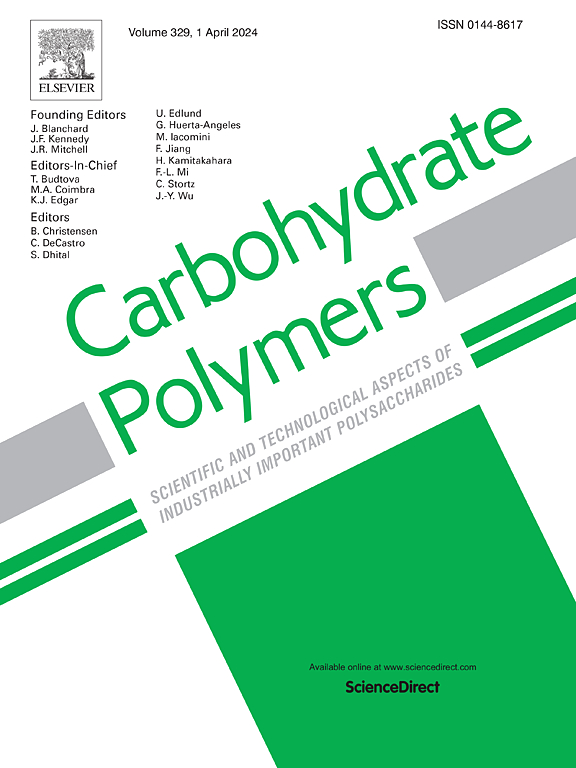Polysaccharide-based nanosystems as vaccine adjuvants: A review
IF 10.7
1区 化学
Q1 CHEMISTRY, APPLIED
引用次数: 0
Abstract
Vaccines serve as effective tools for preventing infectious diseases, with adjuvants playing a pivotal role in enhancing immunogenicity, reducing antigen dosage, and minimizing adverse reactions. To mitigate the suboptimal efficacy and safety concerns that constrain current adjuvants, novel formulations exhibiting enhanced safety and potency are required for development. Natural polysaccharides have been employed as vaccine adjuvants. Due to inherent biopharmaceutical limitations—including transient systemic exposure, structural instability, rapid clearance kinetics, and suboptimal bioavailability—their clinical translation as vaccine adjuvants remains constrained, resulting in attenuated immunogenicity. Recent advancements in polysaccharide-based nanosystems have attracted significant attention due to their dual functionality: serving as protective antigen-delivery platforms while concurrently acting as immunostimulants to amplify host immunity. These engineered systems encapsulate polysaccharides and antigens within nanosystems, conferring resistance against enzymatic degradation and enabling sustained release to maintain antigen depot effects. Mechanistically, they enhance vaccine efficacy through multiple pathways: activating antigen-presenting cells (APCs), improving antigen uptake efficiency, achieving targeted delivery, and modulating immune responses, thereby synergistically boosting antigen immunogenicity and overall immune performance. This review examines several promising polysaccharide-based nanosystems adjuvants, outlines their applications in vaccines, and emphasizes their immunomodulatory effects. Furthermore, the potential of polysaccharide-based nanosystems provides valuable theoretical insights for the advancement and application of human vaccine adjuvants.

基于多糖的纳米系统作为疫苗佐剂:综述
疫苗是预防传染病的有效工具,佐剂在增强免疫原性、减少抗原剂量和减少不良反应方面起着关键作用。为了减轻限制当前佐剂的次优疗效和安全性问题,需要开发具有增强安全性和效力的新配方。天然多糖已被用作疫苗佐剂。由于固有的生物制药限制——包括短暂的全身暴露、结构不稳定、快速清除动力学和次优生物利用度——它们作为疫苗佐剂的临床转化仍然受到限制,导致免疫原性减弱。基于多糖的纳米系统的最新进展引起了人们的极大关注,因为它们具有双重功能:作为保护性抗原递送平台,同时作为免疫刺激剂增强宿主免疫力。这些工程系统将多糖和抗原包裹在纳米系统内,赋予抗酶降解的能力,并使其能够持续释放以维持抗原储存效应。从机制上讲,它们通过多种途径增强疫苗效力:激活抗原提呈细胞(APCs)、提高抗原摄取效率、实现靶向递送和调节免疫反应,从而协同提高抗原免疫原性和整体免疫性能。本文综述了几种有前途的基于多糖的纳米系统佐剂,概述了它们在疫苗中的应用,并强调了它们的免疫调节作用。此外,基于多糖的纳米系统的潜力为人类疫苗佐剂的发展和应用提供了有价值的理论见解。
本文章由计算机程序翻译,如有差异,请以英文原文为准。
求助全文
约1分钟内获得全文
求助全文
来源期刊

Carbohydrate Polymers
化学-高分子科学
CiteScore
22.40
自引率
8.00%
发文量
1286
审稿时长
47 days
期刊介绍:
Carbohydrate Polymers stands as a prominent journal in the glycoscience field, dedicated to exploring and harnessing the potential of polysaccharides with applications spanning bioenergy, bioplastics, biomaterials, biorefining, chemistry, drug delivery, food, health, nanotechnology, packaging, paper, pharmaceuticals, medicine, oil recovery, textiles, tissue engineering, wood, and various aspects of glycoscience.
The journal emphasizes the central role of well-characterized carbohydrate polymers, highlighting their significance as the primary focus rather than a peripheral topic. Each paper must prominently feature at least one named carbohydrate polymer, evident in both citation and title, with a commitment to innovative research that advances scientific knowledge.
 求助内容:
求助内容: 应助结果提醒方式:
应助结果提醒方式:


